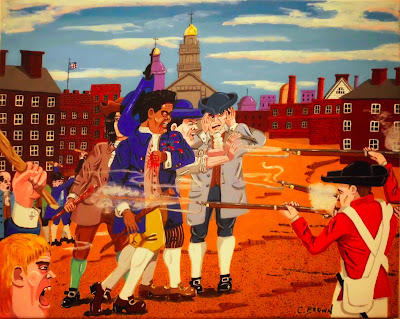 |
| "THE BOSTON MASSACRE" Acrylic Painting by Carl G. Brown (c) 2012 www.cbrownartprints.com |
It is thought that Crispus Attucks' father was an African slave given the name Prince Younger and his mother was a Natick Indian, of the Wampanoag tribe, named Nancy Attucks. Being 50% Native American accounted for Attucks fair mulatto complexion.
As recorded in a 1750 issue of the Boston Gazette, a slave named 'Crispas' , aged 27, escaped bondage from the William Brown plantation on September 30th of the same year. A 10 pound bounty was offered for his capture and return.
Attucks was described as a large strapping man, for the times, who stood 6 feet 2 inches. He was also described as having short curly hair. Known for his bold and audacious temperament, local bounty hunters knew that he was sure to put up a vicious fight and none ever attempted to capture him. As a testament to his fearlessness, Crispus Attucks never escaped far from his enslaved family and moved to Boston which was not far from Framingham, but He was never captured or returned to force servitude. Finally, Attucks orchestrated his permanent escape by serving for the next 20 years as a seaman on merchant vessels and whalers harbored out of Boston. Eventually any request to recapture Attucks faded over the years because he spent most of his time away on long voyages. On his short stays in port Attucks traversed throughout Colonial Boston as a free man.
On March 5, 1770, due to colonial unrest, Boston was under martial law and being patrolled by British soldiers, known as "Red Coats". All the fire arms of the colonists had been confiscated. This further infuriated the citizens who strongly wanted liberation and independence from British rule, as did a majority of the other British Colonies because of the high taxation the British Government placed upon them. Attucks, just returning from a long sail to the Bahamas, was back in Boston briefly awaiting another merchant vessel that was scheduled to ship out to North Carolina in a few days. Eye witness statements confirmed that on that day a large group of Colonist gathered and were verbally lashing out at a British Soldier for accosting a young colonial boy. They began throwing snowballs at him. Other "Red Coats" came to the aid of their fellow soldier with intentions of breaking up the mob but they were also pummeled by a deluge of snow balls, rocks and sticks. Attucks, who was said to always be up for a good fight, joined the riot accompanied by a group of his fellow seamen and rope makers all wielding clubs. As they made their way to the front of the crowd a club was thrown striking one of the British soldiers (some say it was thrown by Attucks others say by someone else). The soldiers opened fire on the unarmed crowd. Crispus Attucks was struck twice in the chest and was killed instantly, the first to die in the "Boston Massacre". A total of five were killed that day and six were wounded. Cripus Attucks and the other four killed were buried as heroes in a common grave at Granary Burial Ground. The "Boston Massacre", the moniker given the event by Samuel Adams, was the catalyst that helped to ignite the American Revolutionary War. Although only armed with a club, Crispus Attucks, an African American and a Native American, was the first martyr to fall while fighting against British tyranny.